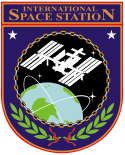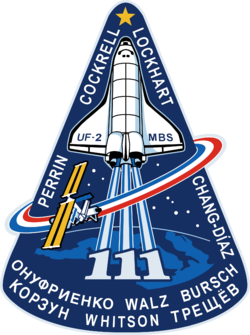STS-111
| STS-111 | |
|---|---|
| Znak expedice | |
 | |
| Údaje o expedici | |
| Na stanici | ISS |
| Loď | Endeavour |
| COSPAR | 2002-028A |
| Členů expedice | 7 |
| Počet výstupů do vesmíru | 3 |
| Délka výstupů do vesmíru | 19 hodin a 31 minut |
| Datum startu | 5. června 2002 21:22:49 UTC |
| Kosmodrom | Kennedyho vesmírné středisko, Florida, USA |
| Spojení se stanicí | 7. června 2002 16:25 UTC |
| Délka letu | 13 dní, 20 hodin, 35 minut a 56 sekund |
| z toho na stanici | 7 dní, 22 hodin a 7 minut |
| Odlet ze stanice | 15. června 2002 14:32 UTC |
| Datum přistání | 19. června 2002 17:57:41 UTC |
| Místo přistání | Edwardsova letecká základna, Kalifornie, USA |
| Fotografie posádky | |
 Zleva: Perrin, Lockhart, Cockrell a Diaz | |
| Navigace | |
| Předcházející | Následující |
| STS-110 | STS-112 |
STS-111 byla mise amerického raketoplánu Endeavour k Mezinárodní vesmírné stanici. Cílem letu byla doprava zásob na stanici a výměna Expedice 4 za novou posádku Expedice 5. Uskutečnily se tři výstupy do otevřeného vesmíru.
Posádka
 Kenneth D. Cockrell (5) – velitel
Kenneth D. Cockrell (5) – velitel Paul Scott Lockhart (1) – pilot
Paul Scott Lockhart (1) – pilot Franklin Chang-Diaz (7) – specialista mise
Franklin Chang-Diaz (7) – specialista mise Philippe Perrin (1) – specialista mise ISS
Philippe Perrin (1) – specialista mise ISS
Posádka ISS Expedice 5 dopravená na ISS
 Valerij G. Korzun (2) – velitel ISS
Valerij G. Korzun (2) – velitel ISS Peggy Whitsonová (1) – letový inženýr ISS
Peggy Whitsonová (1) – letový inženýr ISS Sergej Y. Treščev (1) – letový inženýr ISS
Sergej Y. Treščev (1) – letový inženýr ISS
Posádka ISS Expedice 4 dopravená na Zemi
 Jurij Onufrijenko (2) – velitel ISS
Jurij Onufrijenko (2) – velitel ISS Caral E. Walz (4) – letový inženýr ISS
Caral E. Walz (4) – letový inženýr ISS Daniel W. Bursch (4) – letový inženýr ISS
Daniel W. Bursch (4) – letový inženýr ISS
V závorkách je uvedený dosavadní počet letů do vesmíru včetně této mise.
Výstupy do vesmíru (EVA)
- EVA 1: 9. červen, 2002 – 7 h, 14 m (Diaz, Perrin)
- EVA 2: 11. červen, 2002 – 5 h, 00 m (Diaz, Perrin)
- EVA 3: 13. červen, 2002 – 7 h, 17 m (Diaz, Perrin)
Reference
V tomto článku byl použit překlad textu z článku STS-111 na anglické Wikipedii.
Externí odkazy
 Obrázky, zvuky či videa k tématu STS-111 ve Wikimedia Commons
Obrázky, zvuky či videa k tématu STS-111 ve Wikimedia Commons  Galerie STS-111 ve Wikimedia Commons
Galerie STS-111 ve Wikimedia Commons
Média použitá na této stránce
STS111-S-001 --- The STS-111 patch symbolizes the hardware, people, and partner nations that contribute to the flight. The Space Shuttle rises on the plume of the Astronaut Office symbol, carrying the Canadian Mobile Base System (MBS) for installation while docked to the International Space Station (ISS). The mission is named UF-2 for ISS Utilization Flight number two. The ISS orbit completes the Astronaut Office symbol and is colored red, white, and blue to represent the flags of the United States, Russia, France, and Costa Rica. The Earth background shows Italy, which contributes the Multi Purpose Logistics Module (MPLM) used on this flight to re-supply ISS. The ten stars in the sky represent the ten astronauts and cosmonauts on orbit during the flight, and the star at the top of the patch represents the Johnson Space Center, in the state of Texas, from which the flight is managed. The names of the STS-111 crew border the upper part of the patch, and the Expedition Five (going up) and Expedition Four (coming down) crews’ names form the bottom of the patch. The NASA insignia design for Shuttle flights is reserved for use by the astronauts and for other official use as the NASA Administrator may authorize. Public availability has been approved only in the forms of illustrations by the various news media. When and if there is any change in this policy, which is not anticipated, the change will be publicly announced.
These four astronauts comprise the prime crew for NASA's STS-111 mission. Astronaut Kenneth D. Cockrell (front right) is mission commander, and astronaut Paul S. Lockhart (front left) is pilot. Astronauts Philippe Perrin (rear left), representing the French Space Agency, and Franklin R. Chang-Diaz are mission specialists, assigned to extravehicular activity (EVA) work on the International Space Station (ISS).





